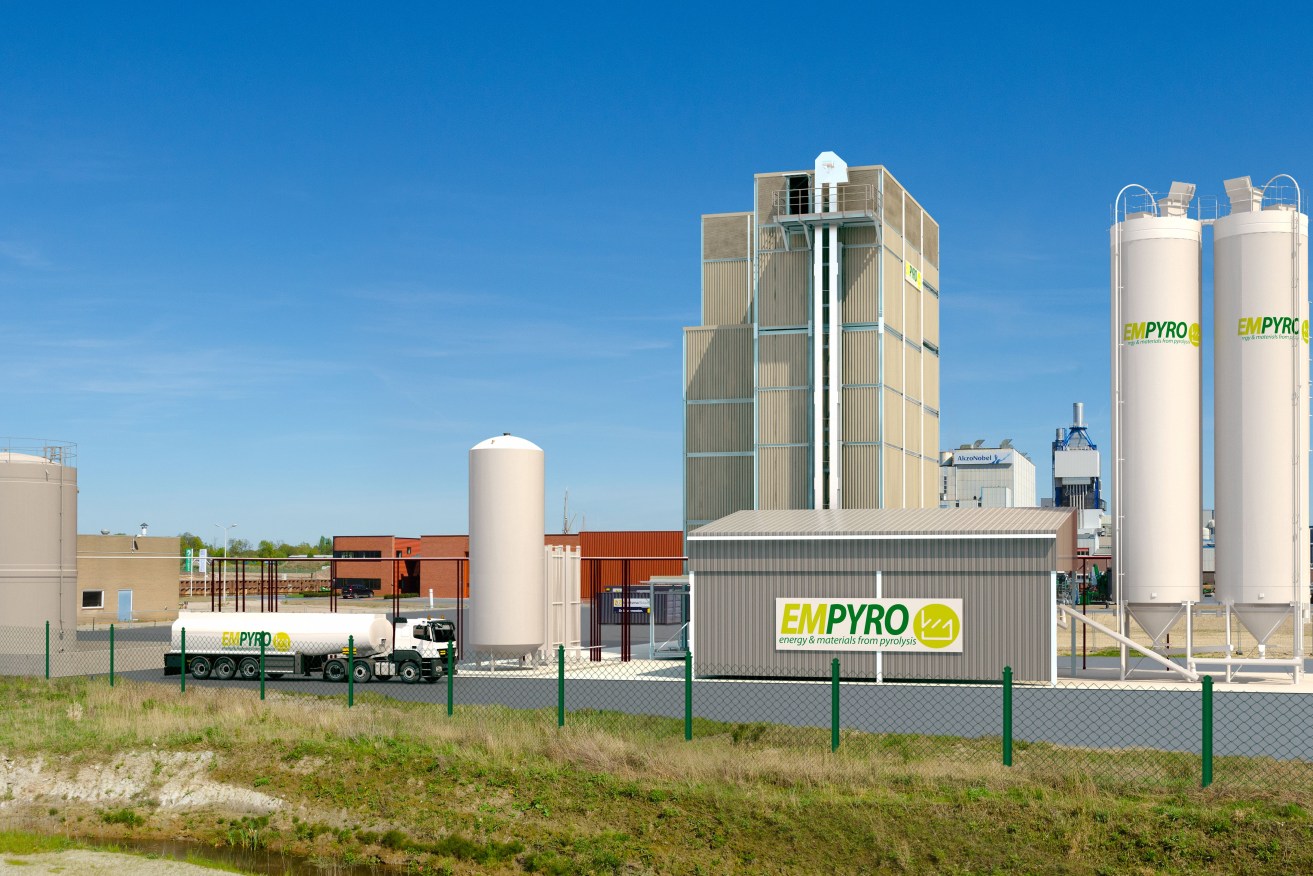Revolutionary approach could see organic waste power buildings
A revolutionary new approach to using organic waste to create electricity will be trialled in Adelaide next year, with a view to creating a renewable energy system powerful enough to fulfil the needs of multi-storey buildings.

A pyrolysis plant in The Netherlands that would be the design basis for similar plants in South Australia for oil manufacture. Supplied image
The University of Adelaide is collaborating with Melbourne-based company Enecon Pty Ltd to trial the production of electricity and of energy for heating and cooling from pyrolysis oil created from biomass residues – non-food organic waste.
If both partners are happy, and funding can be finalised, a full demonstration project valued at more than $1 million is expected to follow.
“Just the first system, our proposed demonstration for a carbon-neutral Adelaide, could provide enough renewable energy for all the needs of a multi-storey building and many other systems can follow from the demonstration, ranging from energy for individual buildings through to electricity generation for thousands of people,” said Enecon’s CEO, Colin Stucley.
Enecon is one of 11 finalists who have won $10,000 to help develop their concept as part of the State Government’s Low Carbon Entrepreneur prize, which aim to generate ideas that will help Adelaide become the world’s first carbon neutral city. While that’s a pretty small sum in the grand scheme of things, Stucley said it was significant.
“The Government’s initiative got us talking,” he said. “The initial money is very helpful; we need to raise a lot more money independently but it got us around the table and it demonstrates a genuine commitment on behalf of the Government to help make these things happen. And they are the things that you look for.
“The first commercial project we would look to develop in Adelaide would be about $70 million and you won’t raise that sort of money unless you can show government commitment and government consistency.”
Enecon’s project could be the first in the world to combine trigeneration (the production of electricity, heat and cooling in one process) with pyrolysis oil. Trigeneration is common, but usually involves non-renewable fuel sources. Pyrolysis oil is relatively new, with still only a handful of production plants around the world.
Enecon is collaborating with a company that already operates a large commercial pyrolysis plant in Europe. It can provide oil for the demonstration project and the technology to build commercial plants in Australia if things take off.
Stucley said this initial work could develop into a multi-billion-dollar industry, as pyrolysis oil had multiple uses. Upgraded pyrolysis oil could replace petrol and diesel in motor vehicles and green chemicals also were produced during the upgrading.
To create electricity, heat and cooling, the pyrolysis oil will be used as fuel in conventional turbines, stationary engines and generators that have been modified to accept a new fuel source. Because these turbines and engines can be switched on and off, the renewable energy they produce is dispatchable, and it complements the intermittent energy made by wind and solar systems.
Enecon hopes to run its Adelaide trial for more than 1000 hours both to test operational issues and to develop data that will quantify the potential market in Adelaide and across the state. Work to date suggests that its systems can become a genuine alternative power source to replace or augment electricity produced from fossils fuels, while supporting other renewable sources such as wind or solar.
Stucley said that in some situations Enecon’s power may be cheaper than the alternatives and in others more expensive. Feasibility studies would be needed in each situation, but “the work we’ve done to date shows we can provide a competitive alternative”.
“We don’t expect our customers to be out of pocket. Some of them will want a financial incentive, others will do it because of the sustainability,” he said.
“The sustainability benefits get everybody around the table to discuss these systems but nobody will stay at the table if they are going to lose money by making the change. At the end of the day it has to be a pragmatic business decision, which is why we talk about identifying customers, negotiating energy supply agreements they are comfortable with then using that to lock in debt and equity to build commercial plants.”
The University of Adelaide’s energy manager, Vikram Kenjle, said the university had signed up for the feasibility study because electricity usage accounted for most of the university’s carbon footprint.
“The university is interested in understanding the cost-effectiveness of innovative renewable energy and carbon-neutral power generation systems which can be installed at its campuses to not only accelerate the path towards low carbon operations, but also to potentially improve the energy security to its facilities,” he said.
“On-site, state-of-the art renewable or carbon neutral power generation systems could also allow the University to better link future teaching and research activities to operational sustainability.”
Enecon and 10 other finalists will be in Adelaide next week as part of the Adelaide to Zero Carbon Challenge Design Week. The week includes a free live demonstration day where the public can meet the finalist teams to learn more about their projects in the lead up to their public pitches and the winners announcement on Friday 21 October.
Solstice Media has partnered with the South Australian Government to provide information about the transition to a low-carbon economy.




